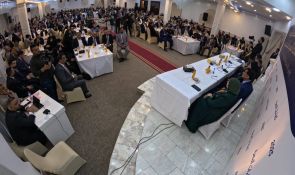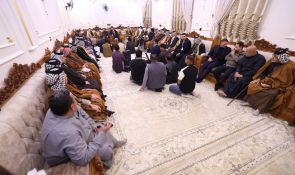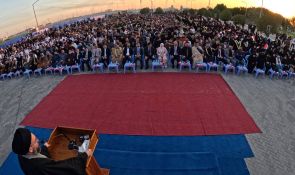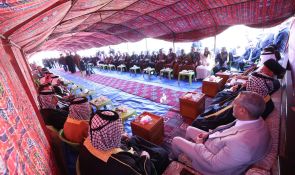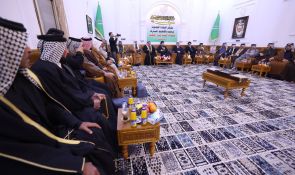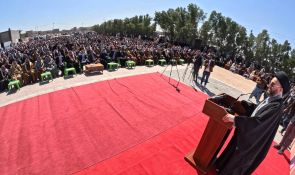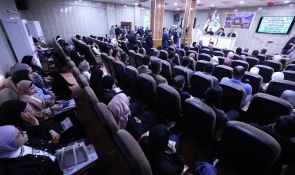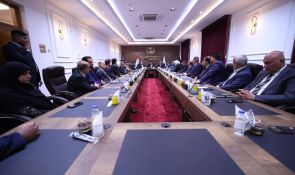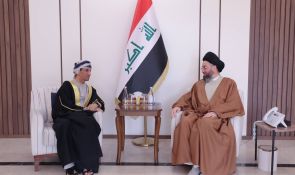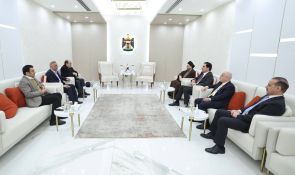The Text of Sayyid Ammar Al-Hakeem's Speech at the Middle East Peace and Security Forum in Duhok November 16, 2021
In the name of Allah, the most gracious, the most merciful.
Praise be to Allah, Lord of the worlds, and may Allah’s peace and blessings be upon our master Muhammad, his pure family and his chosen companions.
Your Excellencies.
Ladies and gentlemen.
Peace be on you, Allah’s mercy and His blessings.
I am so pleased to be part of this important forum which is being held at this scientific and academic edifice in the dear city of Dohuk and under the generous sponsorship of brother Masrour Barzani, Prime Minister of the Kurdistan Region, at this sensitive and critical circumstance in the history of our country and the region and in concurrence with the International Day for Tolerance.
- Thinking of ways to make sustainable peace and security in Iraq and the region, and working on it, represents a conscious effort that deserves appreciation.
- Because peoples of the region are still suffering from a trilogy: (tension and internal instability, fear of the future, and dissatisfaction with the solutions and remedies offered to recurring crises), as they look to the elites and decision-makers, to present more serious, realistic and practical procedures that guarantee them a safe present, a clear future and permanent stability. These are essential elements for any advancement, development and construction, and they are necessary motives for creating a reassuring, hopeful and energetic environment.
The large number of crises, accumulation of tensions and the declining confidence in solutions represent major obstacles in the way of sustainable peace and security, which can only be achieved through a long series of plans and projects that requires cooperation and solidarity internally at the level of nations, and externally at the level of the region and neighboring countries.
- We can summarize the internal steps at the national level into the following two steps to make the required peace and security:
First: Building an inclusive national identity that expresses the aspirations, dreams, visions and affiliations of the people of the one nation towards achieving social peace and unifying efforts and ranks to face challenges, and investing in common opportunities by all.
We are in need of a clear project in managing the diversity existing in our countries and making it a point of strength to reach the stability of souls and convictions within the framework of reassuring social and political contracts for all.
We believe that the conflict of the projects and visions presented by the elites and decision-makers are still obstructing this inevitable and hopeful birth in the path of stability.
Second: Addressing the roots of the gap between countries and their peoples on the level of: (building solid institutions, fair procedures and mutual trust), which is a trilogy that needs a lot of work, effort and credibility, and we are still far from achieving it.
The citizen who has lost their trust in state institutions, justice, measures and ability to keep their dignity, present and future, do not rush towards any aspiring projects no matter how promising, necessary and helpful they are. This makes achieving the goal a difficult thing.
The slowness of countries at the level of institutions or the fairness of procedures is one of the things that prevent internal cooperation and solidarity. These gaps serve as a counterproductive environment that is safe for terrorism, extremism, anxiety and frustration.
We see this clearly today on the internal Iraqi level. The low electoral participation, the clear doubts about the credibility of the electoral process, the widespread dissatisfaction with the results and the political reality, the questioning of the credibility of state’s institutions and procedures, the feeling of the absence of justice, dignity and citizenship, the constant frustration, and clear anxiety about the present and the future. These all are worrying and dangerous matters that need radical treatments.
Including organizing the relationship between the Federal Government and KRG and resolving the outstanding issues within constitutional frameworks.
Policies of imposing political reality and fait come at the expense of the citizen’s trust, legitimacy of the regime, credibility of the state, and the legitimacy of political practice in the state-building process. These are things that do not come well and do not reassure the elites and wisemen.
Policies of generalization, flotation, confusion, intimidation and frustration against the Iraqi citizen place all elites and decision-makers in front of a heavy historical responsibility, which we have warned of its consequences ten years ago and we will continue warning of them, counting on the honorable patriots and wise elites to overcome them and provide a safe alternative
Frankly saying, there is no security, no peace, no state, no system, no stable and coherent institutions without a real review of this flawed and distorted reality, and without stopping the twisted attempts and projects that attempting to defend for this unfortunate reality.
On the regional level, we believe that the trilogy that shapes the features of the solution to reach mechanisms for resolving the ongoing differences and conflicts is as follows:
First: Openness and Constructive Regional Dialogue: We cannot imagine real peace and sustainable security for the Middle East without a reconsideration of the relations between the countries of the region on the basis of openness, dialogue and mutual respect.
Differences with interests, visions and projects are normal and reasonable, but exaggerating them, considering them as existential and working to resolve them by breaking and attacking the other are abnormal and non-reasonable matters.
Dialogue is like neighborliness, both of which are fatal and necessary for all.
Moving from overlapping, unresolved and complex problem formulas to sorting and disassembling files formulas is the required step for constructive dialogue.
Our countries must disassemble their problems in the form of specialized files, for example: (the terrorism file, the water file, the border file, the oil file, the trade file..) separately and make room to prioritise mutual interests on the basis of a technical, not a purely political, vision before any dialogue, understanding or decision.
Experience has proven that many misunderstandings are addressed and treated with disassembly, deliberation, and an objective view of mutual interests.
Second: Stopping the destructive regional leadership and leadership conflicts of a security, military and intelligence nature and replacing them with the politics of competition and positive racing towards the construction of nations and the achievement of scientific, technological and economic leaps, and the administrative and institutional revolutions that push countries towards imposing their progress by the force of logic rather than the logic of force.
- Such positive steps will improve the position of the negotiating countries in expanding their interests at the regional level and creating safe environments for their exchange with others.
Sovereignty and leadership need successful and rational models, away from showing muscle and temporary changing capabilities.
Third: Major partnerships on the level of the region and at all scientific, cultural and economic levels that bring peoples closer to each other and develop interests and expand their areas. Major partnerships, huge investments, joint projects, interlinked interests, and mutual relations are all solutions to achieve what we are looking for in resolving the conflict and transforming it into a greater power, more opportunities and a securer and more prosperous future.
Ladies and gentlemen.
Despite the remarkable successes achieved in Iraq on security and political levels, the surrounding transformations in the region on one hand, and the internal challenges on the other, still represent major obstacles to the wheel of construction and the desired change, in a manner that fits its historical weight, and regional and international position.
Among these challenges:
First: The Iraqi sovereignty
The foreign military incursion on Iraqi borders, and the political interference in the internal affairs, still threatening the unity of the Iraqi people, and delaying its right to sovereignty over its entire land, waters and skies. This interference must be stopped among the first foreign policy priorities of the forthcoming Iraqi government through practical and deterrent measures. Iraq possesses many cards that make it in a position of power and decision.
Second: the economic challenges
The Iraqi economy is still a rentier economy, and there is a great problem in the sectors of industry, agriculture and modern technology, which threatens Iraq and the future of its generations in light of what we are witnessing of a significant rise in population growth rates and an increase in unemployment among young people. It is unfortunate that we did not witness during the last period any real and serious plans to address this major imbalance due to security challenges, internal political conflicts and poor planning and management.
This doubles the responsibility and makes it heavy on the political blocs and the forthcoming government to stop this dangerous economic deterioration in Iraq. We are facing an economic time bomb that will not be only limited to Iraq, but will also include the entire region. Poverty, deprivation and lack of opportunities for young people. these represent the most prominent temptations that extremist terrorist groups exploit in every part of the world.
Third: the climate challenges
The global warming crisis, lack of rains, absence of fair water policies and the large desertification of agricultural lands, especially in Iraq. This puts us in front of a serious environmental disaster which requires effective international and regional measures that contribute to saving the universe.
All countries in the region must have real priorities to confront these challenges and prevent the frightening desertification that our lands are witnessing through exchanging experiences, coordinating fair water policies, and benefiting from the dissemination of experiences of clean energy use.
The Iraqi government is concerned with encouraging and participating in qualitative initiatives and measures to confront climate challenges and prevent their dangerous consequences on the countries and peoples of the region.
Fourth: regional challenges
The international outlook towards the Middle East must be changed, and agendas that are based on exploiting societal and political differences must be abandoned for the peoples of the region, which is rich in religious, intellectual and sectarian diversity.
We need cooperative regional councils that are aware of the danger of future consequences. The climate crisis, economic changes, societal and security challenges make it difficult for any government to achieve success alone without effective regional coordination and cooperation.
We in Iraq are well aware of this, and we hope that the concerned countries will cooperate with us in practical measures that achieve the interests of all to protect the future of the region and its people from the consequences and dangers facing everyone.
Fifth: Political challenges
The political system in Iraq still suffers from many structural crises. Despite adhering to the democratic path and the peaceful transfer of power, it still suffers from adapting to major societal changes, financial and administrative corruption, and it lacks the infrastructure to keep pace with the renaissance of the economy, industry and agriculture.
Over the past years, the political process has not been able to leave the crisis of confidence or overcome the complexities of the past, nor has it succeeded in adopting strategic plans implemented by successive governments to manage the state.
In addition to this, the worsening crisis towards the electoral process which has resulted in an unprecedented number of appeals and complaints about the credibility of the procedures and outcomes.
We were the first political powers to congratulate the winners of the 2021 elections, despite we have many evidence, documents and questions which affects the entire electoral process and its clear irregularities, but this does stop us from:
- Adhering to the democratic option.
- Believing in the peaceful transfer of power.
- The necessity of relying on peaceful ways and legal methods in objection.
- Respecting the choice of voters and participants in the electoral process.
- Changing the members of IHEC and the electoral law did not lead to a broader participation of voters, which has left us in front of a minority of participation, which led to a winning minority, and the non-winners formed another majority to join the list of participation abstainers. This will put us in front of a self-confident ruling minority and worrying for the majority.
- The elections did not produce clear political balances in terms of a decisive numerical majority or close and homogeneous blocs that form a comfortable and mutually agreed majority on a solid governmental platform for the next four years.
- We think it is necessary, at this stage, to create real solutions and understandings on 3 levels.
The first level: Finding a formula of understanding and cooperation to get out of the political blockage for the purpose of forming a strong and stable government capable of managing its responsibilities properly.
The second level: dealing with the consequences of the current electoral process, with a serious review of the electoral law and IHEC and its procedures.
The third level: restoring trust between the public, its democratic system, state institutions and political powers.
- From here we call for a wide national political initiative that brings together all the winning forces (on the level of seats or votes) and on the level of (accepting the results or objecting them) and on the level of (large powers or young emerging and independent forces), to develop a formula of understanding that leads to restoring balance to the political process through an inclusive national agreement, adopted by everyone, with clear and practical mechanisms, points and timings.
There is no doubt that such an agreement needs awareness and sacrifice from all parties, without harming the rights of the winners or skipping over the demands of the objectors, in order to move forward and get out of the bottleneck, and overcoming the tension and political suffocation.
We also suggest and warn from many important matters in this regard:
First: It is necessary for all parties to follow the legal and peaceful ways of objection and negotiation.
Second: Considering Iraqi blood as a red line that is not be crossed by everyone.
Third: commitment to an independent national dialogue away from foreign interference of all kinds and parties.
Fourth: It is necessary to address all electoral inputs and outcomes in any future agreement.
Fifth: Establishing clear mechanisms for resolving differences during and after the formation of the government.
Sixth:Lifting the prior vetoes and rationalizing the ceilings of negotiation by all parties.
Seventh: showing the highest degree of flexibility, containment and reassurance for all parties involved in the negotiation.
Eighth: Respecting the choices of the parties that wish to participate, abstain or oppose the government or parliament.
Ninth: Dividing roles between the forthcoming government and parliament in terms of empowering the winners in the government as well as the opponents and abstainers in parliament to find a state of political balance.
Tenth: A national agreement paper is to be voted on as a parliamentary decision on its first held official session.
In the end, I would like to renew our wishes for the success of this conference and forum, and our generous greetings to our people in the Kurdistan region in general and to the hospitable governorate of Dohuk in particular.
May peace, mercy and blessings of Allah be upon you.


